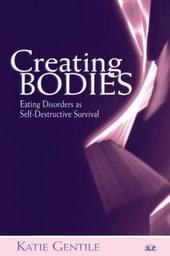
|
Creating Bodies: Eating Disorders as Self-destructive Survival
Paperback
Main Details
| Title |
Creating Bodies: Eating Disorders as Self-destructive Survival
|
| Authors and Contributors |
By (author) Katie Gentile
|
| Series | Relational Perspectives Book Series |
|---|
| Series part Volume No. |
v. 33
|
| Physical Properties |
| Format:Paperback | | Pages:216 | | Dimensions(mm): Height 229,Width 152 |
|
| ISBN/Barcode |
9780881634389
|
| Classifications | Dewey:616.8583690651 |
|---|
| Audience | | Professional & Vocational | |
|---|
| Illustrations |
Illustrations
|
|
Publishing Details |
| Publisher |
Taylor & Francis Ltd
|
| Imprint |
Analytic Press,U.S.
|
| Publication Date |
27 September 2006 |
| Publication Country |
United States
|
Description
Amid the welter of clinical studies, memoirs, and other death-defying tales of eating disorders, we remain unclear about the relationships among trauma, anorexia, and bulimia, and about the psychological pathways to recovery. Creating Bodies offers the gripping story of healing and transformation detailed in one woman's diaries. Hannah wrote 18 diaries between the ages of 14 and 32. In the excerpts reprinted herein, we watch Hannah navigate violent adolescent friendships, descend into anorexia and bulimia, marry an abusive man, struggle to recover memories of sexual abuse, and finally to heal. And we learn of her interaction with Katie Gentile, who analyzed her diaries and met with Hannah to discuss the latter's own understanding of the diaries and of the diary analysis. Through a close study of both the content and structure of Hannah's diaries, Gentile shows how unspeakable, embodied remnants of sexual trauma become symbolized and how, within this process, Hannah's bulimia functioned as both an act of self destruction and a lifesaving form of resistance. Anchored in relational psychoanalysis and critical feminist theory, Creating Bodies provides a uniquely longitudinal account of the development of, and ultimate recovery from, an eating disorder fueled by childhood sexual abuse. An invaluable contribution to the literature on adolescent and adult eating disorders, it is also a thoughtful meditation on how the act of writing deepens issues of relationality and, over time, promotes cure. Psychoanalysts will be intrigued by the rich process issues embedded in prose journals, notes, and letters - both close to and distinct from clinical process issues - that Gentile uses to understand Hannah's projects of self-destruction and reconstruction.
Reviews"From its title to its final word, Katie Gentile's book is an enormous, undeniably original adventure. How many psychoanalytic books can we say that about? She analyzes the lifelong diaries of a woman who is otherwise unknown to her. In the course of this analysis, which entails not only conventional psychoanalytic interpretation but also close observation of how the diary's words are laid out on its pages, Gentile mines new understandings of the impact of trauma on the experience of time and space. For Gentile to offer us this novel way of thinking and writing as her first book took real courage. She was right to do it. It works. Read it." - Donnel Stern, Ph.D., Editor, Contemporary Psychoanalysis "Katie Gentile's psychoanalytic page-turner -- part case study, part literature, part personal narrative -- inhabits an intersubjective space that draws and invites us in. The resulting unity of reading experience issues from the author's calm acceptance of paradox, of the discontinuities and ruptures that propel her subject's struggle to create coherence by transforming her corporeality -- her eating, her body, her sex -- into a text. Gentile's transparent, deeply reflective voice generates a polylogue in which she engages with her subject, her multiple disciplines, herself, and her readers. Don't miss it!" - Muriel Dimen, Ph.D., Author, Sexuality, Intimacy, Power (Analytic Press, 2003) "In many ways, this book is a very brave project. The subjectivity of the author is touched by her subject, Hannah, via the texts, in a way that is both distant and intimate. The author makes skillful use of extensive theoretical exploration and develops this novel concept of temporality to build a case for the healing power of being aware of how experience at different points in time is linked. Gentile's discoveries offer an important contribution that can inform a more respectful and attuned approach to treating trauma and eating disorders." - Theresa Fassihi, Ph.D., Bulletin of the Menninger Clinic, 72(4), 2008 "Creating Bodies is a highly original and insightful exploration of the relationships between the body and the mind, the body and food, and textual and corporeal bodies. Through her empathic collaboration, frustration, and desire to know Hannah, Gentile produces a persuasive version of events and their effects, creating temporal links between Hannah's traumatic past and her present. Gentile's analyses of these texts reveal how Hannah's need to reconnect with her abusive history and thrive, rather than merely survive, is achieved through a reading and writing process in which power is carefully negotiated." - Rhona O'Brien, Feminist Theory, 10(3), 2009 "Creating Bodies...brings to the table some extremely important concepts that are often missing from general discussions of eating disorders. All in all, this book is a useful reading experience for those clinicians who are trying to understand people who struggle with eating disorders." - F. Diane Barth, Clinical Social Work Journal, 2009 "By challenging herself to know, Gentile challenges us to think. With the anchor of her stimulating and incisive mind, questions abound in many directions. Only rarely does a book allow for such a varied journey. Creating Bodies promises an adventure filled with a provocatively pitched balance between the answers it gives and the questions that remain. For this experience of thought alone, the book is well worth its challenge." - Judith Brisman, Ph.D, Contemporary Psychoanalysis, 44(3), 2008
|